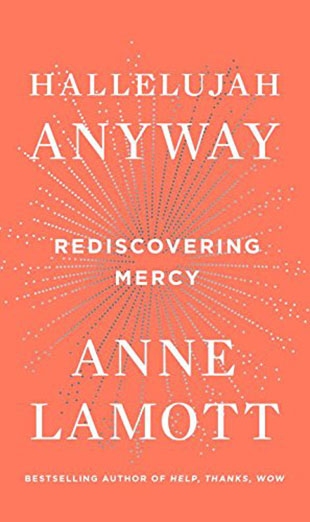"There are times in our lives — scary, unsettling times — when we know that we need help or answers but we're not sure what kind, or even what the problem or question is. We look and look, tearing apart our lives like we're searching for car keys in our couch, and we come up empty-handed. Then when we're doing something stupid, like staring at the dog's mismatched paws, we stumble across what we needed to find. Or even better, it finds us."
This observation by Anne Lamott opens her tenth book, and we know immediately what she means; such graces happen. She is the kind of spiritual author we yearn for during these scary and unsettling times. She has been to hell and back many times and carries within herself survival character qualities that we cherish: resilience, wisdom, faith, and humor.
Lamott believes we are all starving for mercy, which she defines as radical kindness. "Mercy means offering or being offered aid in desperate straits. Mercy is not deserved. It involves absolving the unabsolvable, forgiving the unforgivable." The love of mercy gives us a "shot at a warm and generous heart, which is the greatest prize of all."
After some creative musings on the parable of the Prodigal Son and the story of Jonah, the always self-reflective author decides to figure out when and where she lost touch with mercy, sharing the arc of a life that will be familiar to many readers. For example, by high school, "Real life was often slow and disappointing, not one bit like TV. Life seemed to be set up to shine light on our defects . . . Because we had lost contact with the truth of our innately merciful selves, it was almost impossible to have self-respect." Eventually, we get to old age, which Lamott calls "hard, hard, hard." She discovers that extending mercy to others and to herself can be costly. But "it can help you rest and breathe again for the time being, which is all we ever have."
Mercy can show up in the least likely places, Lamott suggests, drawing upon the Parable of the Good Samaritan. She praises the community she found as she got sober and the joys of singing and shared silence. On a visit to Hiroshima, she laments that the bomb that destroyed that city was our best thinking at the time. She adds ironically: "Now drones are our best thinking, and Botox."
Lamott has always been transparent about her life, her family, friends, and challenges. This is one of the qualities that draws people to her books. She gives you permission to be confused, to mess up, and to not be sure you know what you are doing or where God might next show up in your life. Just watch, she says, and feel and take the risk to be changed by mercy.
